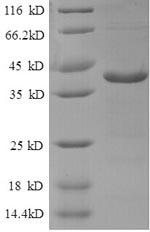Recombinant Human V-type proton ATPase subunit F (ATP6V1F)
CAT:
399-CSB-EP623100HU-03
Size:
1 mg
Price:
Ask
- Availability: 24/48H Stock Items & 2 to 6 Weeks non Stock Items.
- Dry Ice Shipment: No




Recombinant Human V-type proton ATPase subunit F (ATP6V1F)
- CAS Number: 9000-83-3
- Gene Name: ATP6V1F
- UniProt: Q16864
- Expression Region: 1-119aa
- Organism: Homo sapiens
- Target Sequence: MAGRGKLIAVIGDEDTVTGFLLGGIGELNKNRHPNFLVVEKDTTINEIEDTFRQFLNRDDIGIILINQYIAEMVRHALDAHQQSIPAVLEIPSKEHPYDAAKDSILRRARGMFTAEDLR
- Tag: N-terminal GST-tagged
- Source: E.coli
- Field of Research: Transport
- Assay Type: Developed Protein
- Relevance: Subunit of the peripheral V1 complex of vacuolar ATPase essential for assbly or catalytic function. V-ATPase is responsible for acidifying a variety of intracellular compartments in eukaryotic cells.
- Purity: Greater than 90% as determined by SDS-PAGE.
- Activity: Not Test
- Length: Full Length
- Form: Liquid or Lyophilized powder
- Buffer: If the delivery form is liquid, the default storage buffer is Tris/PBS-based buffer, 5%-50% glycerol. If the delivery form is lyophilized powder, the buffer before lyophilization is Tris/PBS-based buffer, 6% Trehalose, pH 8.0.
- Reconstitution: We recommend that this vial be briefly centrifuged prior to opening to bring the contents to the bottom. Please reconstitute protein in deionized sterile water to a concentration of 0.1-1.0 mg/mL.We recommend to add 5-50% of glycerol (final concentration) and aliquot for long-term storage at -20℃/-80℃. Our default final concentration of glycerol is 50%. Customers could use it as reference.
- Function: Subunit of the peripheral V1 complex of vacuolar ATPase essential for assembly or catalytic function. V-ATPase is responsible for acidifying a variety of intracellular compartments in eukaryotic cells.
- Molecular Weight: 40.4 kDa
- References & Citations: "Initial characterization of the human central proteome."Burkard T.R., Planyavsky M., Kaupe I., Breitwieser F.P., Buerckstuemmer T., Bennett K.L., Superti-Furga G., Colinge J.BMC Syst. Biol. 5:17-17 (2011)
- Storage Conditions: The shelf life is related to many factors, storage state, buffer ingredients, storage temperature and the stability of the protein itself. Generally, the shelf life of liquid form is 6 months at -20℃/-80℃. The shelf life of lyophilized form is 12 months at -20℃/-80℃.
